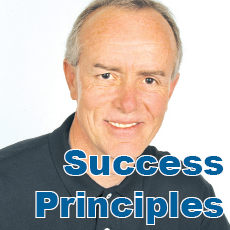
William “Bud” Hart, of Haverhill, shares “Success Principles”—ideas for living a greater, better and more accomplished life, and building habits that stick. He also coaches clients to incorporate strategies for boosting their mental and physical performance during everyday living.
Recently my wife and I watched a group of people do something that we agreed neither of us would think of doing. I’ll skip the details, they’re not important. What is relevant is our individual thinking about why they may have done what they did? I can’t tell you the number of times in conversations with my wife (including this most recent one) that I have tried to look at the brighter side of things only to hear something like, “Why do you try to find the good in EVERYTHING?”
Studies conducted by Dr. John Cacioppo, then at Ohio State University, now at the University of Chicago, and others, have demonstrated that the brain reacts more strongly to stimuli it deems negative. It’s a built in negative bias that we all are said to possess. In other words there is a greater surge in electrical activity in our brain and our attitudes are more heavily influenced by downbeat news than good news. This isn’t news to me. For years I’ve known that my thinking is wired to look at the negative first. These days I just prefer to think a bit differently.
Why? My answer is simple. I can never truly know why anyone does anything (none of us can). So what is so terrible about admitting this and trying to look at the bright side of a person’s words and actions instead of what is wrong? Oversimplifying this by assuming WE are right isn’t doing anyone any favors.
One of the most difficult principles I had to think about in my coach training was the notion that behind every person’s behavior there is a positive intention. This postulation was very hard to fathom and at times it still is (with my built in negative bias). But then I think. What is wrong with looking for the good in everything, or at least not immediately and totally buying into the bad?
There is a little story I read many years ago (source unknown) that illustrates my point. It goes, a rabbi was asked to adjudicate a case. The first man presented his argument, and the rabbi, after hearing the evidence, said to him, “You are right!” Then the second man presented his argument, and the rabbi, after hearing his evidence, said, “You are right!” At this point, the rabbi’s wife turned to her husband and asked, “How can both of these men be right?” The rabbi thought for a moment and then said, “Darling, you are right!”
These days I think more like the rabbi in this story. As the saying goes there are always two sides to a story and the truth usually lies in the middle. And I find like the rabbi, when discussing the merits of other people with my wife that sometimes it is just easier to say “Darling, you are right!”
William “Bud” Hart is a certified “Mindset” Coach, Accountability Partner and Business Consultant. Visit Hart Group, www.hartgroupma.com for more on coaching.